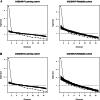Assessing physicians' and nurses' experience of dying and death in the ICU: development of the CAESAR-P and the CAESAR-N instruments
- PMID: 32843097
- PMCID: PMC7448438
- DOI: 10.1186/s13054-020-03191-z
Assessing physicians' and nurses' experience of dying and death in the ICU: development of the CAESAR-P and the CAESAR-N instruments
Abstract
Background: As an increasing number of deaths occur in the intensive care unit (ICU), studies have sought to describe, understand, and improve end-of-life care in this setting. Most of these studies are centered on the patient's and/or the relatives' experience. Our study aimed to develop an instrument designed to assess the experience of physicians and nurses of patients who died in the ICU, using a mixed methodology and validated in a prospective multicenter study.
Methods: Physicians and nurses of patients who died in 41 ICUs completed the job strain and the CAESAR questionnaire within 24 h after the death. The psychometric validation was conducted using two datasets: a learning and a reliability cohort.
Results: Among the 475 patients included in the main cohort, 398 nurse and 417 physician scores were analyzed. The global score was high for both nurses [62/75 (59; 66)] and physicians [64/75 (61; 68)]. Factors associated with higher CAESAR-Nurse scores were absence of conflict with physicians, pain control handled with physicians, death disclosed to the family at the bedside, and invasive care not performed. As assessed by the job strain instrument, low decision control was associated with lower CAESAR score (61 (58; 65) versus 63 (60; 67), p = 0.002). Factors associated with higher CAESAR-Physician scores were room dedicated to family information, information delivered together by nurse and physician, families systematically informed of the EOL decision, involvement of the nurse during implementation of the EOL decision, and open visitation. They were also higher when a decision to withdraw or withhold treatment was made, no cardiopulmonary resuscitation was performed, and the death was disclosed to the family at the bedside.
Conclusion: We described and validated a new instrument for assessing the experience of physicians and nurses involved in EOL in the ICU. This study shows important areas for improving practices.
Keywords: Caregivers; Death; End-of-life experience; Intensive care unit.
Conflict of interest statement
None of the authors declare any conflict of interest in relation to this manuscript.
Figures


References
-
- Gerritsen RT, Hofhuis JGM, Koopmans M, van der Woude M, Bormans L, Hovingh A, Spronk PE. Perception by family members and ICU staff of the quality of dying and death in the ICU: a prospective multicenter study in the Netherlands. Chest. 2013;143(2):357–363. doi: 10.1378/chest.12-0569. - DOI - PubMed
Publication types
MeSH terms
Grants and funding
LinkOut - more resources
Full Text Sources
Research Materials

